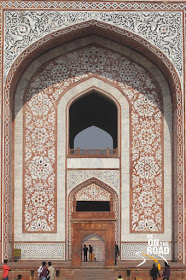
There is so much more to Agra than the ‘Taj Mahal’. There are its colorful and vibrant bazaars, its other UNESCO World heritage sites (Agra Fort and Fatehpur Sikri), its Mughal era gardens, its river side, its mosques and its iconic tombs.
You are never too far away from a work of art in Agra. One such work of art is the Tomb of Emperor Akbar, located about 10 kms away from the Taj Mahal. This Mughal architectural masterpiece is one of Agra’s top tourist attractions and a must visit on your Agra holiday.

Built in the early 17th century by Akbar’s son Jehangir, this mausoleum is famous for its gigantic size, its massive gateways (similar to that of the Buland Darwaza at Fatehpur Sikri), its inlay panels, its jaali work, the front façade, the arches and the decorated tomb itself. Add to it the stunning red monument that stands in the middle of lush green surrounding with blackbucks roaming its lawns and you have an architectural masterpiece.

Akbar’s tomb would have been grander had the Jats not ransacked and plundered the tomb and looted all its jewels and carpets. Thankfully, a lot of it was restored during the reign of the British and later by the Archaeological survey of India. Today, it stands tall in the Sikandra landscape.

The main entrance is via a massive south facing gate that stands tall with its four white marble chhatri-topped minarets. These minarets are similar to that of the Taj Mahal, but they predate it by a few decades. The red sandstone with which this mausoleum was built offers shades of deep red to the visitor along with gleaming white marble elements and geometric, floral and calligraphic panel designs.
When you look from far, it is its size that is awe-inspiring. But, when you go closer, its inlay panels, geometric patterns and calligraphy captivate your attention.

From up close or far away, Akbar’s tomb is befitting his grand status of one of the largest emperors to have ruled the Indian subcontinent. Don’t miss to visit this place on your next trip to Agra. And yes, there is much more to Agra than just the Taj Mahal.

Best season to visit:
Akbar’s tomb is open all year round, but there are some good times in case you have a particular agenda.
If photography is on your agenda, avoid the foggy months of Dec and January.
If you wish to visit during the summer months, make sure you get there first thing in the morning.
The rains bring in lower crowds, but offer stunning perspectives. This time makes for vibrant photographs.

How to reach there:
The nearest domestic airport would be Agra, though connectivity options would be limited. The other nearest domestic and international airport with great connectivity would be New Delhi international airport (about 2 to 3 hour drive from Delhi to Agra).
The nearest railway station would be Agra. Agra has two main railway stations – Agra Fort and Agra Cantt. Both stations are well connected with the rest of the country.
Agra enjoys great road connectivity with other cities as it is on the golden quadrilateral route of India.
Sikandra is about 10 kms from Agra city. One can take the bus or hire an autorickshaw or cab to reach Akbar’s tomb in Sikandra.

Where to stay:
Agra would be the best place to stay as it offers accommodation that caters to a wide range of needs and budgets.

Other nearby tourist attractions:
1) Taj Mahal – One of the seven wonders of the world
2) Mehtab Bagh – A Mughal era park on the banks of the Yamuna that is known for its fabulous Taj Mahal views
3) Agra Fort – A UNESCO World Heritage site that resembles the red fort in Delhi and that is another magnificent piece of Mughal architecture
4) Baby Taj – One of the prettiest tombs from the Mughal era
5) Fatehpur Sikri – A 16th century city of victory that is also a UNESCO World Heritage Site
No comments:
Post a Comment